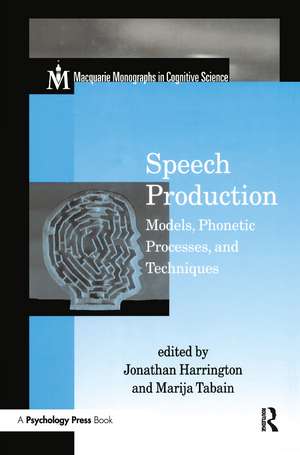Speech Production: Models, Phonetic Processes, and Techniques: Macquarie Monographs in Cognitive Science
Editat de Jonathan Harrington, Marija Tabainen Limba Engleză Hardback – mai 2006
The research presented in this volume considers questions such as: the feed-back vs. feed-forward control of speech; the acoustic/auditory vs. articulatory/somato-sensory domains of speech planning; the innateness of human speech; the possible architecture of a speech production model; and the realization of prosodic structure in speech. Leaders in speech research from around the world have contributed their most recent work to this volume.
Preț: 770.16 lei
Preț vechi: 1106.29 lei
-30% Nou
Puncte Express: 1155
Preț estimativ în valută:
147.38€ • 157.59$ • 122.87£
147.38€ • 157.59$ • 122.87£
Carte tipărită la comandă
Livrare economică 18 aprilie-02 mai
Preluare comenzi: 021 569.72.76
Specificații
ISBN-13: 9781841694375
ISBN-10: 1841694371
Pagini: 400
Ilustrații: 132 b/w images, 10 color images, 27 tables, 29 halftones, 10 color halftones and 103 line drawings
Dimensiuni: 152 x 229 x 27 mm
Greutate: 0.79 kg
Ediția:1
Editura: Taylor & Francis
Colecția Psychology Press
Seria Macquarie Monographs in Cognitive Science
Locul publicării:Oxford, United Kingdom
ISBN-10: 1841694371
Pagini: 400
Ilustrații: 132 b/w images, 10 color images, 27 tables, 29 halftones, 10 color halftones and 103 line drawings
Dimensiuni: 152 x 229 x 27 mm
Greutate: 0.79 kg
Ediția:1
Editura: Taylor & Francis
Colecția Psychology Press
Seria Macquarie Monographs in Cognitive Science
Locul publicării:Oxford, United Kingdom
Cuprins
Introduction. Jonathan Harrington & Marija Tabain. Part 1: Models. Chapter 1. About speech motor control complexity. Pascal Perrier. Chapter 2. A neural model of speech production. Frank H. Guenther, Satrajit S. Ghosh, Alfonso Nieto-Castanon & Jason A. Tourville. Chapter 3. Distinctions between speech and nonspeech motor control: A neurophonetic view. Wolfram Ziegler. Chapter 4. Neural processes underlying speech production of native and non-native phonetic contrasts. Daniel E. Callan. Chapter 5. Production and perception of phoneme contrasts covary across speakers. Joseph S. Perkell, Frank H. Guenther, Harlan Lane, Nicole Marrone, Melanie L. Matthies, Ellen Stockmann, Mark Tiede & Majid Zandipour. Chapter 6. 3D biomechanical tongue modeling to study speech production. Jean-Michel Gérard, Pascal Perrier & Yohan Payan. Chapter 7. Prediction of geometrical vocal tract limits from bony landmarks: Modern humans and Neandertalians. Louis-Jean Boë, Jean-Louis Heim, Denis Autesserre & Pierre Badin. Chapter 8. A physiologically based model of perioral dynamics for various lip deformations in speech articulation. Hiroaki Gomi, Jyunichi Nozoe, Jianwu Dang & Kiyoshi Honda. Chapter 9. Analysis of audiovisual speech intelligibility based on spatial and temporal filtering of visible speech information. Hugo de Paula, Hani Camille Yehia, Douglas Shiller, Gregoire Jozan, Kevin G. Munhall & Eric Vatikiotis-Bateson. Chapter 10. What role does the palate play in speech motor control? Insights from tongue kinematics for German alveolar obstruents. Susanne Fuchs, Pascal Perrier, Christian Geng & Christine Mooshammer. Part 2: Phonetics and cross-linguistic analyses. Chapter 11. Phonetic encoding of prosodic structure. Patricia A. Keating. Chapter 12. Australian Aboriginal languages: Consonant-salient phonologies and the “place-of-articulation imperative”. Andrew Butcher. Chapter 13. Devoicing of word-initial stops: A consequence of the following vowel?. Daniel Pape, Christine Mooshammer, Phil Hoole & Susanne Fuchs. Chapter 14. Articulatory and acoustic correlates of contrastive focus in French children and adults. Lucie Ménard, Hélène Lœvenbruck & Christophe Savariaux. Chapter 15. Temporal and spatial correlates of quantity contrasts in Wolof acoustic, kinematic, and X-ray data. Rudolph Sock, Béatrice Vaxelaire, Johanna-Pascale Roy, Véronique Ferbach-Hecker & Fabrice Hirsch. Chapter 16. Laryngeal adjustments in the production of voiceless obstruent clusters in Berber. Rachid Ridouane, Susanne Fuchs & Phil Hoole. Part 3: Techniques. Chapter 17. Assessing magnetic resonance imaging measurements: Effects of sustenation, gravitation, and coarticulation. Olov Engwall. Chapter 18. Predicting 3D tongue shapes from midsagittal contours. Maureen Stone, Melissa A. Epstein, Min Li & Chandra Kambhamettu. Chapter 19. Observation of tongue-larynx interaction using improved MRI techniques. Sayoko Takano, Kiyoshi Honda & Shinobu Masaki. Chapter 20. Morphing generic organs to speaker-specific anatomies. Maxime Bérar, Gérard Bailly, Matthieu Chabanas, Michel Desvignes, Frédéric Elisei, Matthias Odisio & Yohan Payan.
Recenzii
“The chapters in this volume - by many of the world’s leading speech scientists - offer a fascinating snapshot of the state of speech production research today. The scope of the volume is broad and evidence comes from a variety of sources such as computer modeling, first and second language learning, neurogenic speech disorders, hearing impairments, and phonetic characteristics of different languages, making this a very valuable reference source for the graduate student and researcher in the field.” - William J. Hardcastle, FBA, Director, Speech Science Research Centre, Queen Margaret University College
“This book is a highly informative collection of chapters on speech production and should contribute significantly to our understanding of relevant aspects of language cognition and acquisition, and to the improvement of speech synthesis and speech recognition systems for their use in robotics.” - Daniel Recasens, Universitat Autònoma de Barcelona and Institut d’Estudis Catalans
“This book is a highly informative collection of chapters on speech production and should contribute significantly to our understanding of relevant aspects of language cognition and acquisition, and to the improvement of speech synthesis and speech recognition systems for their use in robotics.” - Daniel Recasens, Universitat Autònoma de Barcelona and Institut d’Estudis Catalans
Notă biografică
Jonathan Harrington, University of Kiel, Germany. Marija Tabain, University of Western Sydney, Australia.
Descriere
This volume brings together researchers from many different disciplines all with a special interest in how speech is produced.












